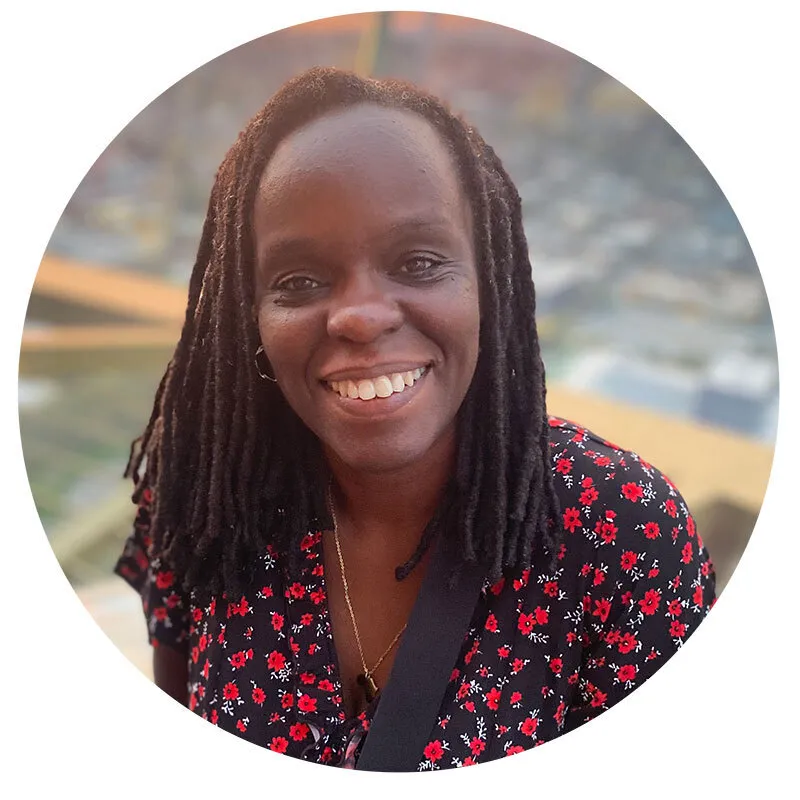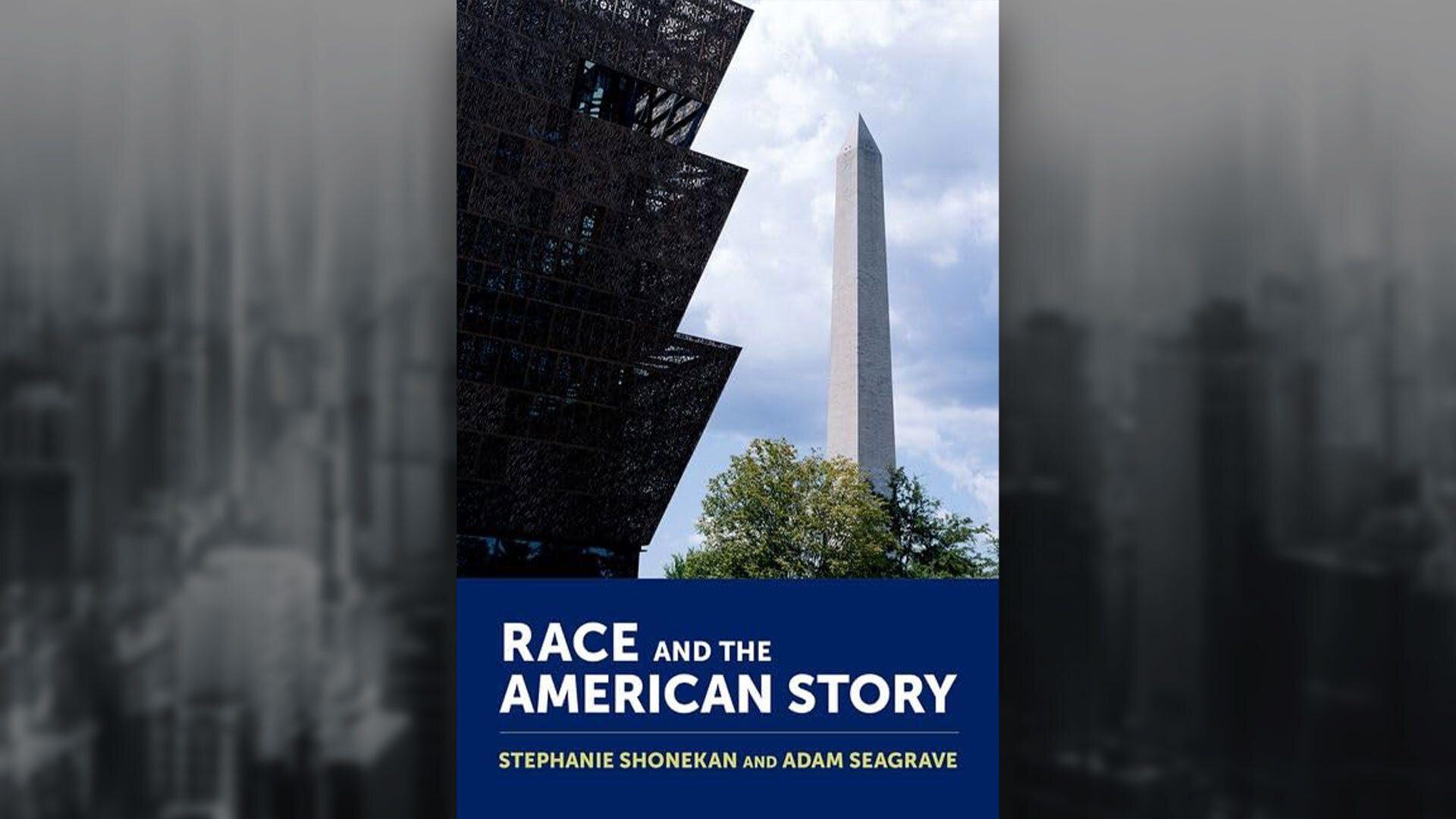- February 28, 2024
- By Jessica Weiss ’05
One week after Stephanie Shonekan arrived in Bloomington, Indiana, from Nigeria for graduate school, her husband, Tomiwa, was out for a walk when a white man stuck his head out of a truck window and yelled a racial slur.
Shonekan had thought she understood racism in America, having studied the works of African American authors like Langston Hughes and Toni Morrison and the music of Louis Armstrong and Miles Davis.
“But there was nothing that could have prepared me for that moment,” said Shonekan, now the dean of the University of Maryland’s College of Arts and Humanities and a professor of ethnomusicology.

A new book she co-wrote takes a unique approach to sharing her experiences as a Black woman, a scholar and an immigrant to the U.S.: by contrasting her story with that of a former colleague, Adam Seagrave, who grew up in California with what he describes as a “patriotic conservatism” and a “blind spot with respect to issues of race.” “Race and the American Story” will be published March 1 by Oxford University Press.
Part personal narrative, part social and political theory, the book stems from a course the two created when they worked at the University of Missouri to facilitate conversations about race in the wake of the 2014 killing by a police officer of an unarmed teen, Michael Brown, near St. Louis. It has since expanded to include an annual symposium.
“Putting down our experiences into a book broadens and extends the impact of the project and enables it to reach more people, more students, more community members, more faculty,” said Seagrave, now an associate professor at Arizona State University.
The daughter of a Nigerian father and Trinidadian mother, Shonekan grew up in post-colonial Africa steeped in a lingering culture of whiteness, from her blue-eyed doll Ingrid to her favorite British romance novels and the Catholic Mass her family attended.
While an undergraduate English major at the University of Jos, she first read Chinua Achebe’s classic novel “Things Fall Apart” and Ngugi wa Thiong'o’s “Weep Not Child,” and understood the struggles of characters navigating the clash of cultures wrought by colonization. Later, a “Literature of the African Diaspora” course helped her further connect the dots of how race and power intersect. She especially enjoyed learning about the Black literature and art that emerged from the Harlem Renaissance in 1920s and ’30s New York City.
“Suddenly I went from being always on the outside to seeing Black people as the protagonist—it really blew my mind,” she said. “There was such a difference in my understanding of the world.”
Shonekan earned a doctorate in ethnomusicology and folklore with a minor in African American studies from Indiana University. She became chair of the Black studies department at Missouri in 2015, just as growing racial divisions on campus boiled over into what she describes as a “collective awakening” after the killing of Brown two hours from campus. She stood by students as they organized marches and demanded the university push back against racism. Out of that came a two-hour orientation program she helped create for all incoming students that used live music to drive important conversations around values like respect and responsibility.
But more was needed. When Seagrave, then a faculty member in the Department of Political Science and the Kinder Institute of Constitutional Democracy, reached out to her about creating a full course, Shonekan quickly agreed.
Launched in 2016, “Race and the American Story” has now been taught by dozens of faculty members to students at universities across the U.S. and Europe. Using primary documents and music—from the Declaration of Independence, to the speeches of Frederick Douglass and Abraham Lincoln, to the politically charged jazz of Max Roach—the course guides students to confront racial injustice in ways most never have done before. Many of the course texts defy characterization as progressive or conservative, but rather lay out guiding principles such as freedom, equality and human dignity that allow students to find a consensus approach to ongoing issues of racial justice.
For instance, Alexis de Tocqueville’s “Democracy in America,” which is a “generally positive, exceptionalist account of American politics and history,” highlights the unique problems associated with American race-based chattel slavery. In one speech, Frederick Douglass praises the authors of the Declaration of Independence and the Constitution while also excoriating the dominant “moral blindness” of the American people.
Though Shonekan and Seagrave don’t prescribe solutions or quick fixes, their book lays out a “new road” that they argue is sorely needed in such a charged moment in the United States. And that’s cause for hope—”not the sanguine optimism of naivete,” they write, “but a sober optimism inspired by real human potential for good.”
“At its best that’s what the American story is about and tries to do,” Seagrave said, “to enable people with significant differences to relate to each other, understand each other, work together, befriend each other.”
The authors even led a version of the course for a book club of about 50 older adults, mostly white citizens in Missouri, which spurred genuine conversation rooted in love and understanding, Shonekan said.
In a review, Peter S. Onuf, Thomas Jefferson Foundation Professor Emeritus at the University of Virginia, calls the book "a welcome antidote to pessimism and polarization” and said it “illuminates the way forward for a troubled nation.”
Shonekan said she hopes others will be inspired to have similar conversations and share their personal stories related to race, providing new and different perspectives on American identity and history. Ultimately, that can lead to the formation of a new, more accurate national narrative—perhaps complicated, but stronger and more beautiful for its diversity, she said.
“Adam and I have had vastly different life paths, with very different cultural backgrounds and upbringings. And we found common ground on this topic,” Shonekan said. “Each of our stories fits equally within the American story.”
This is one of a series of Maryland Today features during Black History Month celebrating Terp faculty, staff, students and alums.
